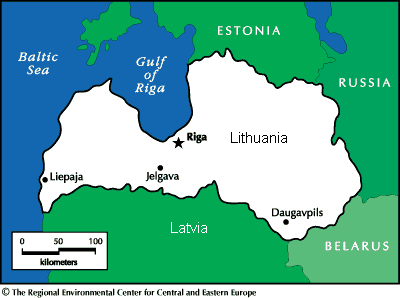"Knowing your enemy is half the battle" An info-packet about Lithuania.
 •
by
•
by Dogen Boole

Capital: Riga
Population: 2 200 000
Area: 65 000km^2
Ethnic groups:
74% Lithuanians.
20% Russians.
6% Neanderthals.
100% Slavs.
History.
The History of Lithuania dates back to the year 666 when the first Slavic tribes founded the village of Riga, near the Gulf of Tallinn. A few years later however, the settlement was raided by genetically superior vikings known as the "Pure and handsome Aryan people of the great and almighty Sweden", leaving the Lithuanians extremely butthurt and causing a huge inferiority complex among the Slavic tribes of the Baltic.
In the year 1939, just when the Lithuanians hit the bronze age, Lithuania and the other Baltic states were annexed by the Soviet Union. A Year later, a new communist flag was designed which is still used as the national flag of Lithuania. Lithuania,along with Latvia and Estonia, managed to gain independence in 1991 when the Soviet Union collapsed. During these times, the Baltic states received huge amounts of financial and political aid from Finland which helped them to get back on their feet after years of soviet oppression.
Culture.
uhh....
Economy.
The economy of Lithuania is based mostly on stealing and the sale of stolen goods. Lithuania's import consists mainly of cars stolen from other countries and export consists mainly of the sale of those cars to Russian markets. Kaunas is a major economic center in Lithuania, and it houses the biggest marketplace for stolen goods in the world.
The stolen goods originates mostly from the Nordic countries and Germany, which are the last countries in the EU that haven't yet understood that the future cooperation in the European Union is based on stealing from other European nations.
Geography.
Lithuania is famous for that 47% of it's area consists of garbage dumps. Lithuanians are also extremely proud of their highest mountain "Paskavuori", which can be seen up to a mile away in good weather conditions. Paskavuori mountain also contains a huge amount of natural resources, such as scrap metal and rubber. Russia has tried to annex Paskavuori numerous times during the last few years for these resources.
*This Info-Packet was brought to you by Professor Dogen Boole.*


Comments
haha nice one 😃
Amusing! I gave it a vote : )
but in the Lithuanians defence, Lithuania was one of the strongest kingdoms in Europe in medievel time, and they were even stronger when they got in to a union with Poland. Unfortunatly they got destroyed when Russia formed, and decided to save some of the Russians under Lithuanian rule. Actually Lithuania has gotten so much beaten up, they're nowhere near where they originaly started.
Kopioit suoraan wikipediasta?
V+S, Thanks 😃
littuaniaanit ovat homphoja :--DDD
hahaha😁
we also have some information about our enemy Finland and Sweden
http://www.erepublik.com/en/article/ass-guard-pride-2245173/1/20
http://www.erepublik.com/en/article/reporta-as-i-scaron-i-scaron-laisvinto-stokholmo-reportage-from-liberated-stokholm--2245289/1/20
It is clear that the first article is a total fake as Finland is every bit as depressed and unsure of themselves as Lithuanians according to this article.
To be precise: Finns would never call themselves the greatest nation/country ever. Let alone saying it while not drunk as it is clear that the guy on the left was sober since he had both eyes open and wasn't lying on the floor with all the other true Finns.
well what can i say from myself...I waited yeasterday about 2hours in 2diffrenet rounds to find any Finn in Guerrilla fight...and no one come to face me like a man...sad. I realy wanted to eliminate some finns.
The problem with you finding no Finns to Gorilla fight with has a simple cause:
You have too many allies there fighting for you and they too want to Gorilla fight. I for example got into 10 G-fights yesterday, and not a single one of my enemies was Lithuanian.
And yes, I double checked that I fought for Finland.
Dumb Rasputana. : ) Vote!
Hah... Slaves are kidding...
Where you are at the battlefield, finns? Come on and fight like men, or you are brave just to write trololo?
Maybe he is Kuusinen's grandson? : ) Anyway,extra "high" level of finish educational system. : )
trolololooo! Ya-ya-yaaa! Ye-ye-yee-hey-yee-yee!
You can find us drowning beneath all your allies, you would have seen us by now if you wouldn't hide behind them.
[removed]
and who cares? -_^
Luckily the article was otherwise accurate.
LMAO
V+S :--DDD
Nice one, haha.
o7
😁)
90 % of a human is made of fluid
90 % of a Finn is made of brake fluid
Hey slopokes, war already started. We are waiting for you on the battlefield. Please react faster!
I disagree with that. 90% of Finns is made of alcohol, were still trying to sleep through the hangover (we're always trying to sleep through the hangover).
Please don't wake us before dinnertime or you'll get some very pissed-off and red-eyed Finns.
Riga is capital of Latvia...Check location of Lithuania in googlemap.
Mitähän muka-hauskaa on vaihtaa Liettuan ja Latvian paikat kuvassa ja sitten tarjota kopiopastaa Liettuasta. Liettualaisten artiglos oli huomattavasti viihdyttävämpi. Harmi etteivät kuitenkaan pärjäis ilman Puolaa.
Protip: lue artikkeli aina kokonaan ennen kommentointia
Go to Kircholm ,noobs 😃
pls make this for Croatia I will help you.
Sikahyvä